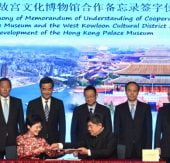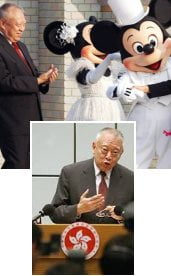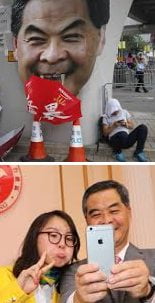 July 1, 2017 will be the 20th anniversary of the handover of Hong Kong from the UK to China. At the behest of Chief Secretary Carrie Lam (allegedly, etc), Beijing will give the city a reunification gift in the form of antiques too humdrum for the Kuomintang/Red Guards/Communist Party to grab/destroy/keep, to appear in a Hong Kong Palace Museum.
July 1, 2017 will be the 20th anniversary of the handover of Hong Kong from the UK to China. At the behest of Chief Secretary Carrie Lam (allegedly, etc), Beijing will give the city a reunification gift in the form of antiques too humdrum for the Kuomintang/Red Guards/Communist Party to grab/destroy/keep, to appear in a Hong Kong Palace Museum.
By groveling for such an act of patriotic generosity, Carrie hopes to get her apparently deepest, if inexplicable, wish: to succeed discredited CY Leung as Chief Executive. Her role in ‘facilitating’ today’s out-of-nowhere Lok Ma Chau polluted-swamp Shenzhen-cooperation Techie Flimflam Zone-Hub looks like a similar credentials-proving performance.
But what would the Hong Kong people like from Beijing on this special occasion? The answer, Ming vases aside, is surely: better local governance.
 At the time of the handover in 1997, Hong Kong was clearly the most prosperous, energetic and progressive place in Chinese-speaking (if not most of) Asia. Today, Taiwan has leaped ahead on democracy and social reformism, Singapore is statistically wealthier and (rightly or wrongly) increasingly confident about a more liberal future course, and Mainland cities are at least in some respects far better planned and more livable.
At the time of the handover in 1997, Hong Kong was clearly the most prosperous, energetic and progressive place in Chinese-speaking (if not most of) Asia. Today, Taiwan has leaped ahead on democracy and social reformism, Singapore is statistically wealthier and (rightly or wrongly) increasingly confident about a more liberal future course, and Mainland cities are at least in some respects far better planned and more livable.
After decades of Mao, the KMT and Headmaster Harry Lee, Sinic Asia Ex-Hong Kong inevitably had some catching-up to do, so it shouldn’t be too surprising that Hong Kong is now relatively less advanced socially or economically, or in pop-culture and soft-power mojo. But most Hongkongers have a sense that their city has seriously under-performed in absolute terms since 1997.
Some supporters of the local establishment might point out that people’s expectations have risen, and/or that globalization has increased inequality and dissatisfaction elsewhere too. Others (including some candid pro-CCP loyalists) might concede that governance has lagged – but it is the fault of the city’s pro-democracy and opposition forces for hindering the administration or spreading chaos.
 Many, if not most, local people would put the blame squarely on the city’s post-1997 leaders and – more to the point – the Chinese government that appointed them and presumably approve their crony-pampering policies. It shouldn’t have been too difficult to appoint officials who would at least match the British colonial regime. But Beijing installed, and keeps installing, administrations that fail to meet basic expectations of competence and fairness.
Many, if not most, local people would put the blame squarely on the city’s post-1997 leaders and – more to the point – the Chinese government that appointed them and presumably approve their crony-pampering policies. It shouldn’t have been too difficult to appoint officials who would at least match the British colonial regime. But Beijing installed, and keeps installing, administrations that fail to meet basic expectations of competence and fairness.
Specific major (and overlapping) failures since the handover: overt favouring of tycoons/vested interests; deliberate reduction in affordable housing supply; unmanageable influxes of Mainland tourists/shoppers and unskilled immigrants; expenditure on infrastructure white-elephants instead of social welfare/quality of life.
This has led to an inevitable popular backlash: rising demand for democracy and political reform; growing alienation from Mainland ways and culture; increased awareness of local identity.
 Beijing’s Communist United Front strategists’ typically subtle responses: shrill demands for greater national consciousness, patriotism, schooling; dark warnings about supposed threats to national security; greater aversion to political reform.
Beijing’s Communist United Front strategists’ typically subtle responses: shrill demands for greater national consciousness, patriotism, schooling; dark warnings about supposed threats to national security; greater aversion to political reform.
Which has led to a fiercer popular backlash, especially among the younger/educated population: street demonstrations; outright hostility to the Communist regime; even an independence/localist movement.
Beijing’s re-doubled freaking-out reaction: undisguised interference in Hong Kong’s mini-elections, university governance and media; blatant downgrading of the role of local courts; intimidation of critics and even abduction of local book publishers.
How does this cycle end? The obvious solution is for China to stop putting idiots or scoundrels in charge. But Beijing puts idiots and scoundrels in charge because it doesn’t trust the people who aren’t idiots and scoundrels. And of course this is not simply about Hong Kong, but about Xinjiang, Tibet, Taiwan, the Internet, etc, etc.
So we welcome 2017 and the July 1 anniversary – a time to ask what another 20 years of this will bring.


“too humdrum for the Kuomintang/Red Guards/Communist Party to grab/destroy/keep, to appear in a Hong Kong Palace Museum …”
Precisely. I can remember running around the tourist hotspots in China in the ‘90’s to find that these impressive architectural landmarks had feck all of interest in them. Then there were the copies (Ming Tombs) because the real ones had been smashed to bits in the ‘60’s. The West Kowloon Waterfront (or whatever its name is) is testament to all that is rotten with Hong Kong. Don’t build a copy of the Palace Museum leave it, as it is now, as a living museum to show the grandkids what 20 years of greed and stupidity can accomplish in today’s Hong Kong. Oh and remember, when visiting, to choke back a tear, that there’s no land to build affordable housing on, as the Lands Department slaps itself on the back for extracting max dollar for a juicy plot from a mainland developer.
The Palace Museum – though clearly part of Beijing’s heavy-handed “get to love the motherland” campaign – is not such a bad idea in itself. But the way it has been sprung fully formed on the Hong Kong public reinforces their perception that Beijing is calling the shots without regard to local wishes.
It is also the latest misstep in the long sad history of mismanagement of the West Kowloon Cultural District project. This should have begun with public consultation to determine what cultural activities Hong Kong people wanted to see better provision for, then designing a complex to provide for them. Instead – in property-obsessed Hong Kong – we had two rounds of consultation on what buildings should go up on the site, with virtually zero discussion of what they would contain. (Other than the meaninglessly named M+ Museum and some sort of Chinese opera theatre, most of us still have no idea!) Now it seems even the building plan can be thrown aside on Beijing’s whim. Truly the whole project – one which could have brought real benefit to Hong Kong – has been handled ass-backwards from Day One.
It’s useful, Hemlock, to have a cogent summary of how we got to the present parlous state. But… the questions remain: are there any circumstances under which HK could (have) survive(d) in tolerable conditions?
And if not, what is going on in Peking’s mind? Did they miscalculate or have they deliberately destroyed the territory?
It is almost presumptuous to try to add to Big Lychee’s post today, but here’s a little.
For most of its existence, HK was not a very important place. The great city of the Far East was Shanghai, the great city of the British Empire in the East was Singapore. HK’s great years were only from 1949 to 1997. There was not only the industry, the trade, the finance, and the shipping, but it was then that HK made its impact on the world’s popular culture with Suzie Wong, Bruce Lee, and Jackie Chan – no Confucius Institutes could ever have so much soft power. In reply to PD’s (rhetorical) question in his first paragraph, perhaps HK could only have been a great place in the special circumstances of those years. It then had, not only the energy of other great cities, but an uncanny competence and self-confidence. Now it is going back to where it was before. Those who were here before 1997 are unlucky in a way: they know how wonderful it was to be at the party at the top of the mountain, and it is so sad to be going downhill.
Paul Krugman has written in the New York Times, fearing the decline of his own country (I have made one obvious change): “accepting it [decline] as inevitable would become a self-fulfilling prophecy. The road back to what Hong Kong should be is going to be longer and harder than any of us expected, and we might not make it. But we have to try.”
One used to be able to buy charcoal and oil rubbings of smashed and defaced China-sited Christian tomb stones: I have several including a splendid one of a ghost-chaser.
Not any more, because perversely, they are now too valuable.
Through a mechanism that remains mysterious, it may be that a flowering of culture is the sign of coming decadence: not impending, because these things take considerable time. If so, and taking culture in wide sense, to include film of course but even the antisocial media, the US’s near-absolute dominance may be an ominous sign.
However, the logic fails to work the other way. That Crouching Tiger seems to be the most universal cultural object China has been able to cook up is neither here nor there.
It is virtually impossible to imagine the Celestial Empire winning over “foreign” hearts and minds in any meaningful way. Not only is the country/subcontinent irremediably, albeit unconsciously, racist, but its age-old mentality is incompatible with that of most of the rest of the world. Any lasting global domination would require an unimaginable revolution, a complete break with the last 5000 years.
America is safe for a good while yet.